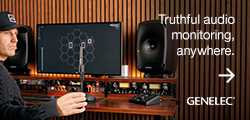 When the Formula One European Grand Prix returned to Valencia, the Spanish town gave its full attention, and local sound company Sagarmanta Producciones turned to DAS Audio systems for the extensive grandstand areas.
When the Formula One European Grand Prix returned to Valencia, the Spanish town gave its full attention, and local sound company Sagarmanta Producciones turned to DAS Audio systems for the extensive grandstand areas.
The company called on more than 30 technicians to set up sound for the 14 grandstands around the circuit using CobraNet distribution.
 Tim Goodyer’s blog on the pro audio press and its relationship with the industry is thought-provoking, and merits serious consideration by those who care about the press and its future.
Tim Goodyer’s blog on the pro audio press and its relationship with the industry is thought-provoking, and merits serious consideration by those who care about the press and its future.
Our press needs a re-think if it wishes to become free and gain the authority, influence and revenue of mainstream media. However, there's a powerful argument that the press is what the industry has made it – or allowed it to become.
 ‘When I was a bass player, I thought I was going to be the best bass player in the world. Then I heard Jaco Pastorius and thought I might give up… Then I discovered that I was a better sound engineer than bass player – and that I was probably the best bass-playing sound engineer around.
‘When I was a bass player, I thought I was going to be the best bass player in the world. Then I heard Jaco Pastorius and thought I might give up… Then I discovered that I was a better sound engineer than bass player – and that I was probably the best bass-playing sound engineer around.
'It was about understanding my skills and realising that they made me unique.’
 The sudden departure of John Oakley from Midas/Klark Teknik on 1 June appears to complete (or possibly continue) a cycle of high-profile exits since The Music Group (owner of Behringer) acquired the British brands in December 2009. Oakley is the fifth board member to depart since the takeover, as directors of Manufacturing, R&D and Sales & Marketing respectively have left the company in the past 18 months.
The sudden departure of John Oakley from Midas/Klark Teknik on 1 June appears to complete (or possibly continue) a cycle of high-profile exits since The Music Group (owner of Behringer) acquired the British brands in December 2009. Oakley is the fifth board member to depart since the takeover, as directors of Manufacturing, R&D and Sales & Marketing respectively have left the company in the past 18 months.
 ‘The industry is ready for a fresh approach to real-world systems presentations,’ says Mark Cunningham, the force behind the newly-unveiled liveculture media brand and Wembley Stadium trade show.
‘The industry is ready for a fresh approach to real-world systems presentations,’ says Mark Cunningham, the force behind the newly-unveiled liveculture media brand and Wembley Stadium trade show.
‘Historically, the demonstration environments available at most trade events are so removed from the reality of their use to make them virtually meaningless. liveculture expo2012 will change all of this.’
 Described by the New York Times as ‘a vision out of New York’s glorious musical past’, Jungle City Studios is the latest in a scarce trail of recording facilities that suggest a return to older ways of working – where acoustics, microphones, monitors and ambience are back on the agenda, and the craft of recording is recovering its former status.
Described by the New York Times as ‘a vision out of New York’s glorious musical past’, Jungle City Studios is the latest in a scarce trail of recording facilities that suggest a return to older ways of working – where acoustics, microphones, monitors and ambience are back on the agenda, and the craft of recording is recovering its former status.
The doors to Jungle City are open, and big-name artists are coming through...
 London’s Westminster Abbey recently installed new speech reinforcement, induction loop and CCTV systems, along with ancillary video, audio and data distribution facilities to support its regular services, as well as concerts, lectures and TV broadcast.
London’s Westminster Abbey recently installed new speech reinforcement, induction loop and CCTV systems, along with ancillary video, audio and data distribution facilities to support its regular services, as well as concerts, lectures and TV broadcast.
Designed and specified by audio/video consultant, Michael Hyland & Associates, these included Martin Audio and RCF speaker systems, as well as cabling and signal/control networks.
 It seems only yesterday that ‘serious’ live mixing consoles were big things. Physically big things...
It seems only yesterday that ‘serious’ live mixing consoles were big things. Physically big things...
Before digital, desks were ten feet across, weighed 300 kilos, needed a platoon of roadies just to get the case lid off and were accompanied by racks of flashing lights and LED ladders. It’s hard to know who was more impressed – the nearby audience or the FOH engineers.
 When the Empire Theatre burned down in 1933, it marked the start of a glorious rebirth. Located in Toowoomba, two hours from Brisbane in Australia, residents have fought to preserve this Art Deco treasure. ‘Within nine months it had been rebuilt to what we see now,’ says Steve Alexander from the theatre technical department. ‘The proscenium is Australian Heritage listed, and any changes at the theatre have to fulfil more than just technical expectations.’
When the Empire Theatre burned down in 1933, it marked the start of a glorious rebirth. Located in Toowoomba, two hours from Brisbane in Australia, residents have fought to preserve this Art Deco treasure. ‘Within nine months it had been rebuilt to what we see now,’ says Steve Alexander from the theatre technical department. ‘The proscenium is Australian Heritage listed, and any changes at the theatre have to fulfil more than just technical expectations.’
 The air is thick with discussion of Audio Video Bridging. So thick, in fact, that it’s more confusing than enlightening to those not directly involved – and to some of those who are.
The air is thick with discussion of Audio Video Bridging. So thick, in fact, that it’s more confusing than enlightening to those not directly involved – and to some of those who are.
Whether you’re walking a trade show floor or surfing the industry’s social media groups, AVB can be as hard to escape as it is to understand. You need to know more...

The opening of a brand new ‘world-class’ recording facility is uncommon news these days. Uncommon in the world's former 'recording centres', anyway, but not Costa Rica...
Because a world-class studio is what the Malvicino Design Group and Guitar Center Professional have given studio engineer – and now studio owner – Federico Hencker.











